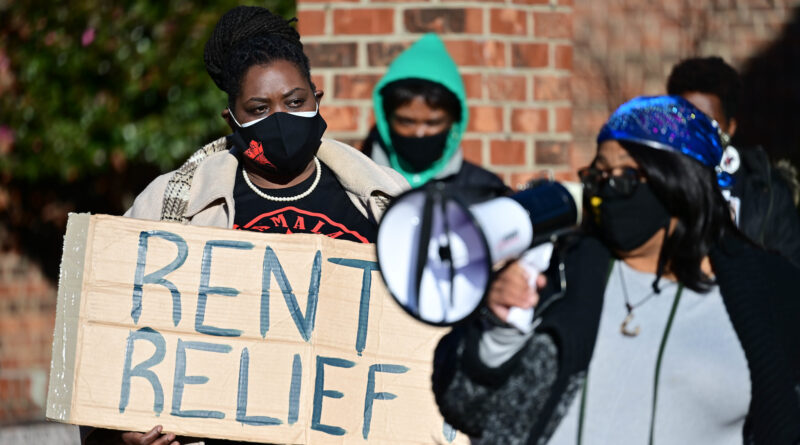“Cancel Rent” and the Burgeoning Housing Crisis

NLF Highlights for March
Millions of people have lost their jobs in a pandemic that has killed over 500,000. Many, who lived paycheck to paycheck, are unable to pay rent. Successive national eviction moratoriums, now ending March 31, have kept most – but not all–landlords from evicting people from their homes. But these measures have left both tenants and landlords in a state of continued uncertainty. They have also highlighted a national housing crisis:
Of the country’s 44 million rental households (about a third of the total population), more than 10 million are behind on their rent.
Most of these are low-income people. Harvard University’s Joint Center for Housing Studies estimates that one in four renters spent more than 50 percent of their income on housing in 2018. This included 72 percent of renters earning less than $15,000 a year and 43 percent of those earning between $15,000 and $30,000. There was also a significant increase in “cost burdened” middle-income earners, those who spend more than 30 percent of their income on housing.
While some people have endeavored to pay at least some of their rent, knowing that once the last moratorium expires, they will owe everything unpaid, many have not. Accordingly, a series of rent relief measures are making their way through legislatures, nationally and locally.
The $1.9 trillion relief package currently before Congress includes $30 billion to help people behind on rent, subject to income qualifications. While this is on top of the $25 billion passed in December, the National Low Income Housing Coalition estimates that at least $100 billion will be needed. A number of states and cities, including New York, have also set up funds to assist with back payments.
The real problem is that rents are too high for low- and even middle-income people.
A winter 2021 article in New Labor Forum by Celia Weaver shows how the New York State tenant movement secured the passage of the Housing Stability and Tenant Protection Act of 2019, which expands New York City’s rent stabilization law to cover the entire state. And in a video that aired on CUNY TV and produced by the CUNY School of Labor and Urban Studies, Laura Flanders interviews Celia Weaver and tenant organizer Winsome Prendergast about the successful campaign to secure New York State’s Covid-19 Emergency Eviction and Foreclosure Protection Act, as well as the burgeoning movement to cancel rent.
Table of Contents
- From Universal Rent Control to Cancel Rent: Tenant Organizing in New York State/ Cea Weaver, New Labor Forum
- CUNY TV’s City Works – New York’s Housing Crisis: Tenant Organizing in a Pandemic
- Reinventing Solidarity Episode 11 – BLACK-LED ANTIRACIST UNIONISM: The Legacy of Ben Fletcher & I.W.W.
From Universal Rent Control to Cancel Rent:Tenant Organizing in New York State<img class="alignright" src="https://files.constantcontact.com/24fd28e8701/0808a4b2-622c-44ea-a340-a98fd744ff4a.jpg" width="301" height="224" /
by Cea Weaver, New Labor Forum
New York’s housing crisis is so entrenched that it is understood to be nearly inevitable. “The rent is too damn high” is both a local adage and a self-fulfilling prophecy that allows politicians and policy makers to tinker at the edges while 50 percent of New York State residents cannot afford their rents and ninety-two thousand go homeless. It has seeped out of the five boroughs and is widely felt all over the state. Capitalist crises, like this one, are always racialized and take their harshest toll on Black and brown people. In this regard, New York’s housing crisis is no different. . .
Read the full article here
CUNY TV’s City Works –
Laura Flanders sits down with Cea Weaver, a tenant advocate, and Winsome Pendergrass, a domestic worker, both who have fought for tenant’s rights and against evictions, to discuss tenant organizing in this fraught time.
Watch the episode here
Reinventing Solidarity Episode 11-
BLACK-LED ANTIRACIST UNIONISM:The Legacy of Ben Fletcher & I.W.W.
This episode shines a light on the political and intellectual contributions of Ben Fletcher, one of the most important, yet least well-known African American labor activists of the twentieth century. Peter Cole’s recently re-issued book, Ben Fletcher: The Life and Times of a Black Wobbly, goes a long way toward bringing Fletcher out of the shadows, enabling contemporary activists and scholars to learn from his work to build a militant, multi-racial union among Philadelphia dockworkers during the early 1900s. In his conversation with New Labor Forum Editor-at-Large, Kafui Attoh, Peter Cole paints a picture of Ben Fletcher, a man whose contributions he ranks with the likes of Fred Hampton and A. Philip Randolph.
Listen here



